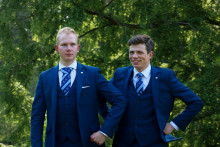Hi there! Two retired glorified event organisers speaking. After reading the column by Niels ter Meer about how we were a decadent boys club of alcohol vendors for a year, we had some opinions of our own, just like Pieter Worm. In this piece, we hope to nuance the discussion and suggest a first step forward (ugh boring).
Ter Meer begins his column by discussing the weird traditions of study associations and how unappealing this must be for candidates to whom these traditions do not appeal. On that note, we have a confession to make, but it’s a bit embarrassing, so don’t tell anyone: we kind of liked our candidate period… especially its silly accessories. And it was not that we knew what we had signed up for, like a blind date, but then for more than three months. We were unaware that we had to wear ties because we were in isolation for the better part of our first year (thank you, covid), so by the time we got selected as the candidate board, we had no clue what we were up for. Were we surprised by the smelly ties? Totally! Childish? Absolutely! And that’s the fun of it! If everything in our board year had only been serious, we would have probably lost our sanity along the way.
Next to Pieter’s argument that the ties make the candidate board recognisable, one should also recognise that the ties literally ‘tie’ the board together. Also for us, these ties have some symbolism attached and are not merely there to embarrass the candidate board members. The ties have been passed on for generations, giving them great symbolic value that boards want to continue to cherish. Fun fact: They are great conversation starters when talking to other candidates and your predecessors.
To give candidates a first glimpse into the board year, the candidate period introduces them to their responsibilities and tasks. Partly, this happens through bonding by fire, which gives a memorable experience and a head start into the board year. The weird tasks and silly assignments in your candidacy are 0-brain cell aspects of a serious training trajectory. We believe it is essential to emphasise that a board year is serious enough by itself. Although it may seem childish to some, these ludicrous tasks and assignments help candidates to make fun and take things with a pinch of salt now and then. Because what would be the point of learning if it weren’t fun from time to time? This is not to encourage swimming lesson-type practices, quite the opposite. It is to balance between seriousness and ridiculousness.
That balance is not cut out for everyone. But the system does welcome non-alcoholics to join a board and have fun (pardon our French, students can’t be alcoholics of course). And if you are asked to do something that you are really not comfortable with, you can say no and that will be accepted. Nevertheless, we are the first to acknowledge that similar personalities and like-minded people will probably end up on a (study association) board and progress into other forms of activism at the UT (exhibit A: we are also in the university council). But as Luuk van der Werf already outlined, there are logical reasons for that. For us, it also was a logical next step to continue working on topics we were passionate about.
An installed board is indeed looking for some characteristics in candidates. Characteristics such as collaboration skills and already being active in the community will help tremendously throughout a board year. A board hopes to deliver suitable successors who can grow in their position whilst ensuring the successful continuation of an association. It is important to open the opportunity up for the widest audience possible, but one shouldn’t try to run before learning to walk. That is the nuance that we missed in the original column. It is more than an elitist club of old boys that selects the new board. In most cases, the selection procedure is a holistic process that takes half a year and has one – if not more - (advisory) bodies involved. The board proposes a candidate board because they know best what an association needs; they are the experienced experts.
Between the lines of Niels's column, he postulates the worry that only a small group of people signs up for a board year and that a large share is scared away. We also observe a decrease in interest for board positions and would like this share and its diversity to increase. However, a discussion on this matter should not start by scaring people off from applying for boards through provocative columns.
Instead, we should open up the debate further (kudos to Niels for starting) and take this discussion to a more constructive, solution-oriented table. Perhaps the next OS General Member Assembly has some space left on the agenda? We’d hope that such conversations result in a student culture where more students feel inspired to apply for board positions. And to put a dirty tie around their neck, for that matter.







